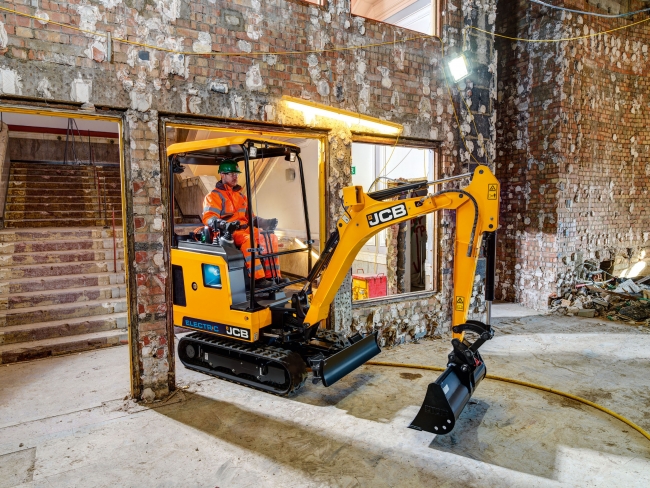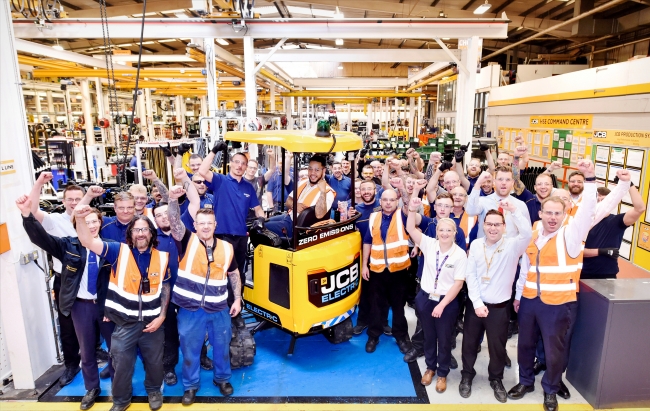3 minute read
JCB electric digger wins MacRobert Award for engineering innovation
JCB’s electric digger has won the 2020 MacRobert Award, the UK’s most prestigious prize for engineering innovation.
The 19C-1E excavator is the world’s first volume-produced fully electric digger and with it, JCB has shown it is possible to make powerful construction machinery without an internal combustion engine. JCB launched the digger in 2019 and has already sold hundreds of the machines. To date, the current fleet has saved the equivalent of 15,100kg in CO2 emissions across 5,616 hours of work.
The MacRobert Award, now in its 51st year, honours the winning organisation with a gold medal and the winning team members with a £50,000 prize.

The Royal Academy of Engineering has announced JCB’s electric digger as the 51st winner of the MacRobert Award / Picture: JCB
As well as significantly reducing carbon emissions, the electric digger has zero exhaust emissions and very low noise levels. This combination makes it much better suited than traditional construction vehicles to operating inside buildings or in areas where noise must be kept to a minimum, for example near hospitals and schools.
JCB’s winning team are: Tim Burnhope FREng, chief innovation officer; Bob Womersley, director of advanced engineering; Lee Harper, chief engineer – electrified machines; Lee Milward, design manager; and Corey Smith, test and development manager.
The MacRobert Award judges praised JCB for demonstrating the utility of electric machines in a construction setting and the potential for future innovation to boost sustainability in the sector.
The hope is that this entry could do for the construction sector what the double MacRobert Award winner Johnson Matthey did for the motor industry with the catalytic converter, which has stopped hundreds of millions of tonnes of pollution from entering the atmosphere.
Professor Sir Richard Friend FREng FRS, chair of the Royal Academy of Engineering MacRobert Award judging panel, said: “JCB’s electric digger is a huge engineering achievement. The team has developed all parts of the electric propulsion system to deliver system performance that matches real customer requirements. This is a huge achievement in itself, but the additional benefits of zero exhaust emissions and much lower noise has lifted the 19C-1E excavator to a new level. The digger is more than a great bit of engineering, however. It has the power to be the catalyst for change in an industry that is responsible for around 10% of all of the UK’s carbon emissions.”

JCB’s innovation was recognised as a vital step in the transition to a low-carbon future as the UK gears up for construction-led economic recovery / Picture: JCB
JCB chairman, Lord Bamford, added: “To win one of the world’s most respected engineering prizes is an outstanding endorsement for JCB’s electrification team, who have achieved so much in applying a science which was new to our business. JCB’s electric mini excavator will contribute to a zero carbon future and help make the world more sustainable. It’s a huge honour for our contribution to be recognised in this way.”
JCB’s electric digger was selected by the MacRobert Award judging panel along with the other shortlisted finalists: the all-electric I-PACE sports utility vehicle from Jaguar Land Rover and ecoSMRT® liquid natural gas reliquification technology from Babcock’s LGE business.
The MacRobert Award is run by the Royal Academy of Engineering with support from the Worshipful Company of Engineers. Since 1969, it has recognised engineering achievements that demonstrate outstanding innovation, tangible societal benefit and proven commercial success.
The first award in 1969 was made jointly for two iconic innovations: the Rolls-Royce Pegasus engine used in the Harrier jump jet, and to Freeman, Fox and Partners for aerodynamic deck design of the Severn Bridge.